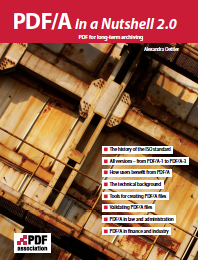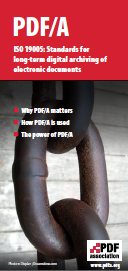The Swedish Agency for Digital Government (DIGG, www.digg.se)
publishes since many years systematically on its website,
in its other channels, and in official documents,
the following untrue and completely incorrect claims
about PDF-based e-invoices:
"Is PDF an e-invoice?
No, a PDF invoice is not an e-invoice.
According to the regulations of Ordinance (2003:770)
on electronic information exchange by government authorities
an e-invoice is an invoice that is issued, sent and received in
a structured electronic format which makes it possible to
process it automatically and electronically.
A PDF invoice does not meet these requirements and thus
cannot be counted as an e-invoice according to
the e-invoice act."
For more details see:
The fact is that since many years offers
- ISO Standard 19005-3:2012 ("PDF/A-3"), and
- ISO Standard 19005-4:2020 ("PDF/A-4f")
- in combination with XML format attachments
precisely the basic features and functionality that are
in demand to enable e-invoicing according to EN 16931.
PDF and XML-based e-invoices,
such as ZUGFeRD (Germany) / Factur-X (France),
can be created/issued, transmitted and received in a
structured electronic format that can be processed
automatically and electronically and they thereby comply
with the European Standard EN 16931.
Both ZUGFeRD and Factur-X are generally suitable
for the exchange of e-invoices between
public administration, companies/suppliers and consumers.
Other EU countries fully accept these characteristics and now
implements PDF-based e-invoicing according to EN 16931
between public administration, companies/suppliers and consumers.
In addition,
e-invoicing according to the technology prescribed by DIGG
for e-invoicing, Peppol, is expressly intended only for
e-invoicing from/between authorities, companies and
other businesses.
Peppol is not designed/intended for e-invoicing
towards private consumers.
Therefore, a human-oriented e-invoice representation is a
absolute prerequisite for a successful implementation
in Sweden of The EU's Accessibility Directive 2025.
Individuals/consumers will then also need to be able to
receive, read and manage incoming e-invoices from
authorities, companies and other businesses.
PDF-based e-invoices
(based PDF/A-3 or PDF/A-4f with XML attachment)
is the technical solution that already today ensures and
enables exactly this for individuals/consumers.
DIGG's unsubstantiated claims stand in stark contrast to facts:
PDF-based e-invoices based on PDF and XML technology
are approved in i.a. Germany and France thanks to the fact
that they de facto fully meets the requirements of being
"structured electronic format" which can be
"processed automatically and electronically"
in accordance with the European standard EN 16931.
It is obvious that DIGG hasn't even bothered to closer
find out what requirements modern PDF technology meets.
Instead, DIGG bases its claim on its own ignorance.
We demand a credible answer from DIGG to the following question:
Unfortunately, DIGG's untrue claims have influenced other
public authorities and actors to uncritically republish the same
false statements on their websites and in social channels.
As the Swedish expert authority for e-invoicing,
DIGG knows of course very well the fact that EN 16931
is completely technology neutral.
It does not advocate or recommend any particular
underlying technology for e-invoicing, it only requires that
the selected e-invoicing function/service meets EN 16931.
"The Swedish Act (2018:1277) on Electronic Invoices as a
Result of Public Procurement" (the so-called e-invoice act),
which applies since 1 April 2019, is likewise technology-neutral:
- "2 § - Electronic invoices refer to invoices that are issued,
transmitted and received in a structured electronic format
which makes it possible to process them automatically."
Our comment on 2 §:
2 § - The requirement is met by PDF-based e-invoices
using the same modern PDF and XML technologies applied for
ZUGFeRD e-invoice (Germany) and Factur-X e-invoice (France);
they meet these requirements and thus the requirements of
EN 16931.
- "4 § - The invoices that a supplier issues to a
contracting authority or unit must be electronic invoices
that comply with the European standard for electronic invoicing
as the European Commission has referred to in
the Official Journal of the European Union.
Notwithstanding the first paragraph,
the supplier and the procurer or unit receive the authority
to enter into an agreement that another standard for
electronic invoicing shall be used."
Our comment on 4 §:
4 § - Clarifies that the chosen technology for e-invoicing
must comply with EN 16931.
The requirement is met by PDF-based e-invoices
using the same modern PDF and XML technologies applied for
ZUGFeRD e-invoice (Germany) and Factur-X e-invoice (France);
they meet these requirements and thus the requirements
of EN 16931.
Also allows authority and supplier the right to use
another standard and technology for e-invoicing
(than the one recommended by DIGG).
Does not mention anything that a PDF-based e-invoice
cannot fulfill the requirements for e-invoicing according
to EN 16931 (which DIGG claims)
- "5 § - Procuring authorities and units are obliged to
receive and process invoices that comply with
the European standard for electronic invoicing."
Our comment on 5 §:
5 § - Clarifies that the chosen technology for e-invoicing
must comply with EN 16931.
The requirement is met by PDF-based e-invoices
using the same modern PDF and XML technologies applied for
ZUGFeRD e-invoice (Germany) and Factur-X e-invoice (France);
they meet these requirements and thus the requirements
of EN 16931.
According to 5 §,
procuring authorities and units are expressly obliged
to also receive e-invoices that are implemented with
other alternative technology; such as PDF-based e-invoices
made with the same modern PDF and XML technology applied for
ZUGFeRD e-invoice (Germany) and Factur-X e-invoice (France),
as long as these comply with EN 16931.
- "6 § - The government or the authority that
the government decides may issue regulations on
structured electronic formats and other forms of
electronic transmission of invoices."
Our comment on 6 §:
6 § - The government has designated
The Agency for Digital Government (DIGG)
to promote the electronic procurement process within
the public administration.
As part of its mission, DIGG has issued regulations on
handling of orders and standards when electronic
information exchange (MDFFS 2021:1).
MDFFS 2021:1, Definitions 4 §,
refers to 2 § of the e-Invoice Act (above).
Clarifies that the chosen technology for e-invoicing
must comply with EN 16931.
The requirement is met by PDF-based e-invoicing
using the same modern PDF and XML technologies applied for
ZUGFeRD e-invoice (Germany) and Factur-X e-invoice (France);
they meet these requirements and thus the requirements
of EN 16931.
- "7 § - The authority that the government appoints (in this case DIGG)
may decide to instruct a supplier to ensure that the invoices which
the supplier issues and which is covered by the regulations in this
law conforms to the European standar for electronic invoicing."
Our comment on 7 §:
7 § - Clarifies that the supplier for e-invoicing
must comply with EN 16931.
The requirement is met if the supplier issues PDF-based e-invoices
using the same modern PDF and XML technologies applied for
ZUGFeRD e-invoice (Germany) and Factur-X e-invoice (France);
they meet these requirements and thus the requirements
of EN 16931.
DIGG has not been mandated by the government to prevent
a supplier that in its business activities with Swedish authorities
use alternative technology for e-invoicing.
Thus, the supplier is free to issue PDF-based e-invoices
that comply with the European standard for
electronic invoicing - EN 16931.
DIGG has thus not been given a mandate by the government
to prevent a supplier that in its business activities with
Swedish authorities use alternative technology for e-invoicing;
PDF-based e-invoices, issued as above, complies with
the European standard for electronic invoicing - EN 16931.
Thus, the published, untrue and baseless, claim by DIGG that
e-invoicing cannot be based on PDF technology falls completely.
DIGG's favoring of certain specific technology for e-invoicing
according to EN 16931 and spreading of delusions must stop!
DIGG is of course welcome to question both
the PDF technology or other technology,
but it is not ok to, as appointed Swedish expert authority,
do so with completely untrue claims, year after year,
that PDF-based e-invoices do not comply with the requirement
to constitute a structured electronic format.
DIGG may have other preferences and may have been
the driving force and actor in the choice of technology,
the so called "The Peppol Infrastructure", for the technical
implemention of e-invoicing between authorities in Sweden.
However, we would like to remind DIGG at this point that
the European Standard EN 16931 for e-invoicing
is a completely technology-neutral standard.
That DIGG, as Swedish Authority,
then takes to prescribe with which specific technique
some electronic services shall be realized with
is completely unique!
It is misleading and not very serious.
This is not how DIGG,
in its role as the Swedish expert authority for e-invoicing, shall act,
if DIGG wants to be a credible expert authority!
Already today, Swedish suppliers to authorities within the EU can use
e-invoicing based on modern PDF/A and XML technology in compliance
with the European standard for electronic invoicing - EN 16931.
The cooperation within the EU aims to remove barriers to trade
in goods/services and transactions across national borders.
Sweden cannot, probably, therefore unilaterally block suppliers in
other countries to use PDF-based e-invoicing to Swedish authorities
as long as it complies with it the European standard for
electronic invoicing - EN 16931.
It's time for DIGG, along with other
responsible actors in Sweden, to wake up now!
Update yourself on how modern PDF and XML technologies solve
digital challenges within the EU and in the rest of the world.
Learn and accept the facts about the technical features in
the PDF document format, with substandards, and the XML format,
as well as the ability of these formats to together comply with
EN 16931 for e-invoicing!
Our strong recommendation and call to DIGG:
Act immediately to declare e-invoices based on PDF technology
(in this case PDF/A-3 and PDF/A-4f, with XML attachment),
as accepted, recognized and approved e-invoice formats for
e-invoicing in Sweden in fully accordance with EN 16931
- just as other EU countries already do.
We request that DIGG:
- Acts in a technology-neutral manner and
cease to favor some specific technique (Peppol)
for e-invoicing between public administration,
companies/suppliers and other businesses in Sweden.
- The European standard, EN 16931, for e-invoicing between
public administration, companies/suppliers and other businesses
is technology-neutral.
- That DIGG has prescribed that only Peppol infrastructure
must be used for e-invoicing between public administration
is not technology-neutral.
- Ceases its baseless claims that PDF-based e-invoicing
does not comply the requirements according to
the European standard for e-invoicing EN 16931
by deleting the following incorrect statements from
its web pages, other channels, as well as in related
official documents such as regulations and ordinances:
- "No, a PDF invoice is not an e-invoice."
- "PDF invoice does not meet these (EN 16931) requirements
and therefore cannot be counted as an e-invoice
according to the e-invoice act."
- Approves any form of e-invoicing
carried out in accordance with EN 16931,
thus also PDF-based e-invoicing,
between public administration, companies/suppliers,
other businesses and consumers in Sweden:
- e-Invoicing based on alternative technology,
such as PDF/A-3 and PDF/A-4f with XML attachment,
meets all e-invoicing requirements according to EN 16931.






 +
+ 